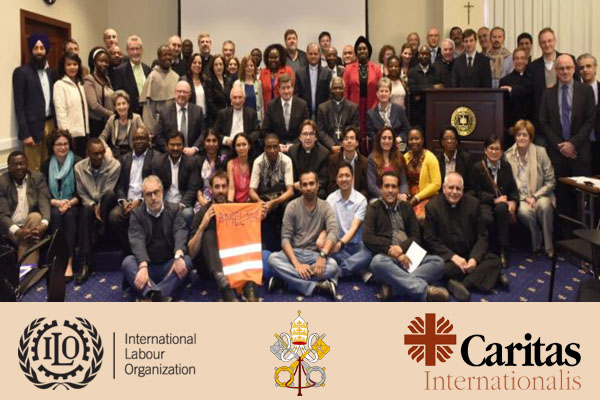Séminaire Mondial sur le Développement Durable et l’Avenir du Travail dans le contexte du Jubilé sur la Miséricorde (2-5 Mai 2016, Rome)

Traduire:
Introduction
The Pontifical Council for Justice and Peace, the International Labour Organization (ILO), Caritas Internationalis, and the Catholic-inspired organisations working group on decent work, and other religious organisations convened in Rome between 2 and 5th May, 2016, to reflect together on the implementation of the Sustainable Development Goals (SDGs) and the Future of Work initiative [1] in the context of the Jubilee of Mercy.
The organisations convened participants dedicated to labour issues at the local, national and international levels to discuss ‘Sustainable Development and the Future of Work in the Context of the Jubilee of Mercy’. These included grassroots and leadership representatives of Catholic-inspired and other religious organisations; trade unions; associations of employers; and other groups involved in the promotion of decent work. This event was a significant step forward on a long route. Labour issues have been one of the original key social justice issues addressed throughout the Social Doctrine of the Catholic Church and promoted by the Pontifical Council for Justice and Peace. These issues figure prominently in many social encyclicals, starting with Rerum Novarum (1891) promulgated by Leo the XIII. Since his election, Pope Francis has repeatedly voiced his concern for the dignity of the workers in many different settings. In his address to the United Nations General Assembly, he reinforced the call for decent work to be at the heart of the SDGs.
Engaging with religious actors has been a significant part of the efforts of the ILO to reach out beyond the world of work. Since its foundation, a meaningful dialogue has been developed on the basis of some of the strongest values expressed in the ILO constitution (1919) or the Declaration of Philadelphia (1944). “There shall not be lasting peace without social justice”, “Labour is not a commodity”, “all human beings, irrespective of race, creed or sex, have the right to pursue both their material well-being and their spiritual development in conditions of freedom and dignity, of economic security and equal opportunity”. In recent years, partnerships and cooperation have been developed with the Holy See, the Pontifical Council for Justice and Peace, Catholic inspired organisations, the World Council of Churches, as well as with Muslim and Buddhist organisation [2].
The global seminar presented three key features. First, it brought to the global level a dynamic of dialogue between social partners and religious actors, a dynamic which has its roots in many different national contexts. Second, it continued the convergence of efforts on issues related to the promotion of decent work in the context of SDGs, for which a wide range of actors ranging from governments, employers, workers, civil society and faith based organisations have been contributing. Third, it opened the path for further contributions on Future of Work initiatives.
The world of work is in constant evolution. Many factors are at play and request renewed, if not new, responses. At this very moment, many questions remain open: will all, including the youth, the migrants, and the most vulnerable, be able to have access to meaningful work? Will the new industrial revolution dramatically change the way we work? How is solidarity going to be developed and organized?
How, in this context, can we give priority to “integral human development” and give concrete support to the goal expressed by Pope Francis: it is essential that we continue to prioritize the goal of access to steady employment for everyone”.
“Work is a necessity, part of the meaning of life on this earth, a path to growth, human development, and personal fulfilment”.
[1] The future of work initiative is a process launched by the ILO in preparation to the its centenary anniversary in 2019. Essential documents, results and guidelines regarding the process can be found at http://www.ilo.org/global/topics/future-of-work/lang–en/index.htm
[2] See for instance : Convergences : Decent work and social justice in religious traditions – A handbook, http://www.ilo.org/pardev/partnerships/civil-society/religious/WCMS_172371/lang–en/index.htm

